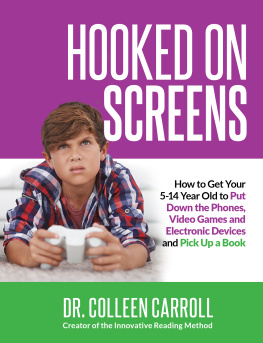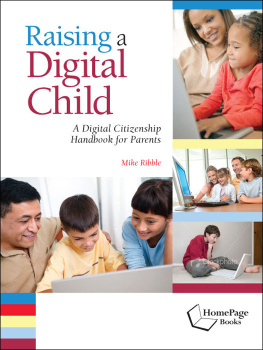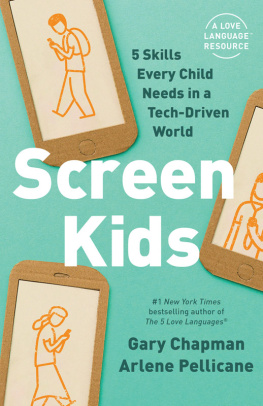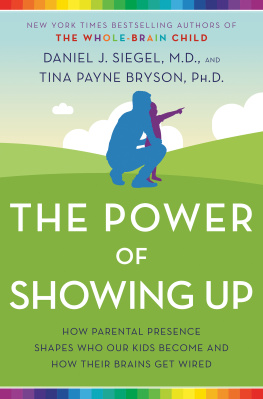Advance Praise for Wired Child
There is no greater threat to family life than the digital deluge we are facing. There is no better book than this one to guide you through the clever clutter of misinformation the device myth makers would have us believe. We are in the midst of a fifteen year social experiment that no one is controlling and its not going so well. Dr. Freed has crafted something here that is sensible, impeccably researched, fairly presented and most of all a message of hope.
KIM JOHN PAYNE, M.Ed., author of Simplicity Parenting and The Soul of Discipline
Before you buy a piece of technology for your childor think of offering tech rewards to him or herread this book. This is not a screed against all things tech, but rather a psychological profile of what technology can and cannot accomplish with children, puncturing many popular myths along the way. It also answers the question of why Steve Jobs limited his childrens access to and use of technology.
JIM TRELEASE, author of The Read-Aloud Handbook
Every parent needs to read this book. Not only is it a treasure trove of significant research that can spur positive action, it also uncovers the underbelly of our industry-culture that intentionally perpetuates harmful digital myths at the cost of our childrens optimal development. Get it. You might get mad, and that may be a good thing.
GLORIA DEGAETANO, author of Parenting Well in a Media Age, coauthor of Stop Teaching Our Kids to Kill
As marketers tout screen technology as a solution to myriad childhood ills, parents need honest information about whats best for children in a digital world. In Wired Child, psychologist Richard Freed combines facts, real-life stories, and tips into a highly readable, timely, and much-needed resource for parents and anyone who cares about childrens health and well-being.
SUSAN LINN, Ed.D., instructor in psychiatry, Harvard Medical School; author of Consuming Kids and The Case for Make Believe
An important book! Wired Child is a timely reminder that billion dollar tech myths dont hold up to scrutiny. Freeds insights spark a critical conversation on InfoTech myths and how kids can benefit from wise use of technology. His psychotherapist perspective is convincing!
RAFFI CAVOUKIAN, singer, founder of Centre for Child Honouring, author of Lightweb Darkweb
Wired Child is a handy, readable, and all-too-timely volume on the myths that have gripped American families about the value of digital tools. Practices alleged to improve kids learning and family relationships actually harm them. Freed exposes the hype and fraud surrounding video games, social media, and other entertainment-based technologies, then concludes with the right correctivenot the elimination of technology, but their productive use.
MARK BAUERLEIN, Ph.D., professor, Emory University; author of The Dumbest Generation
This is an amazing book! A superb piece of scholarship and writing. This book must receive the maximum possible exposure, it is vital to the success and survival of our families and our way of life.
Lt. Col. DAVE GROSSMAN, author of On Combat and On Killing, coauthor of Stop Teaching Our Kids to Kill
This important book powerfully debunks the many harmful myths about the benefits of media and technology in the lives of children and families. Children, families and all of society have much to gain from Wired Child.
DIANE E. LEVIN, Ph.D., Professor of Education, Wheelock College; coauthor of So Sexy So Soon
Freed explodes technology myths with clear and compelling evidence that every parent, teacher, and family professional should read. This book shows how to reclaim our childrens well-being from tech makers and marketers.
JOE KELLY, author of Dads and Daughters
WIRED CHILD
Reclaiming Childhood in a Digital Age
by Richard Freed, Ph.D.
Copyright 2015 Richard Freed, Ph.D.
All rights reserved.
ISBN:150321169X
ISBN 13: 9781503211698
Library of Congress Control Number: 2014920499
CreateSpace Independent Publishing Platform
North Charleston, South Carolina
To my wife Rae
and our daughters, Madeline and Elena
Contents
How destructive digital-age myths are undermining childrens developmentand what we can do to give them the healthy childhood that they need and deserve.
Most parents believe that technology brings the family closer. Why its the opposite and how to foster the parent-child bond.
Contrary to claims that video gaming builds a better brain, kids who game more have less self-control, a brain skill that may be even more important than I.Q. How to improve your childs ability to persevere through challenges.
Refuting the hype, popular entertainment technologies are dragging down kids academic performance. Why traditional schooling has never been more important and how to increase kids interest and success in school.
Popular technologies pose no risks, right? Wrong. An epidemic of video game/Internet addiction is consuming the lives of our children and teens. How to prevent this devastating plague.
Boys are losing out to girls who game less and study more. But girls face their own tech challenges. Helping our boys and girls find a constructive path in a high-tech age.
The widely accepted myth that kids understand tech better than parents has intimidated many parents, so they dont try to guide kids tech use. Learn how to parent wisely in a digital world.
Due to false promises, babies and preschoolers are spending much of their lives staring at screens, missing experiences vital for development. Give young kids the childhood they need.
Preteens and teens now typically shift their ties from parents to peers who are accessible 24/7 via tech. But the bond with parents is more important and must be kept strong.
Teens are supposed to be tech-savvy, but science proves otherwise. How to help teenswith minds heavy on the accelerator, light on the brakenavigate a distraction-filled tech environment.
Its easy to get kids to use technology but challenging to get them to use it productively. How to help children use tech constructively.
Why President Kennedy got it right about technology.
Introduction
S ix months ago, Erin bought her seven-year-old son Jacob a tablet computer. What she heard in the media made her hope the device would give her son a leg up on learning. At his moms urging, Jacob started playing games advertised to improve math skills, but he quickly discovered entertainment video games. His passionate desire to play these was like nothing his mother had ever seen in the child.
At first Erin found she could use the tablet as an incentive to get Jacob to do things like finish his homework or clean his room; however, as she told me in counseling for her son, Jacobs use of the tablet quickly became obsessive. He asked to game constantly, and he started to bargain about homework, saying he would do it, except only in exchange for more game time than theyd agreed. Erin felt her son was changing in other ways, too. Activities he had enjoyed, like playing outside and reading, became less and less frequent. Most recently, when Erin told Jacob to turn his game off, he threw a tantrum and fumed for more than an hour.
Are you feeling a disconnect between what is promised about childrens technology and what youve experienced yourself? Do claims that technology will bring the family closer seem out of sync with kids who retreat to corners or back rooms with their mobile devices for hours at a time? Are assurances of technologys amazing learning opportunities contradicted by the reality that kids often prefer playing video games, social networking, and texting over doing their schoolwork?
Next page





